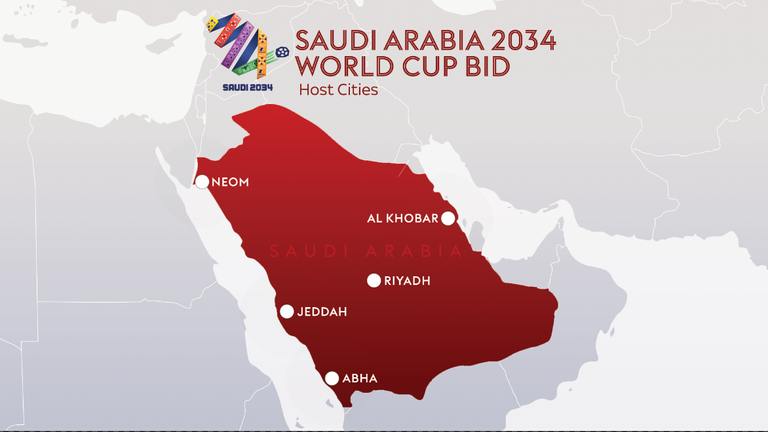FIFA has confirmed the 2034 World Cup will be held in Saudi Arabia, while the 2030 World Cup will be co-hosted by Spain, Portugal and Morocco with the opening three matches in South America.
Both bids were uncontested and were ratified at an online FIFA Congress on Wednesday, with the English and Welsh Football Associations supporting the bids.
Saudi Arabia emerged last year as the sole bidder in a controversial process that saw FIFA combine the decisions on the 2030 and 2034 tournaments into a single vote, meaning delegates either supported or opposed both bids with no separate vote available.
FIFA Congress also ratified the centenary 2030 World Cup, which will be held across six countries in three continents with the opening three games taking place in Argentina, Paraguay and Uruguay.
But the decision to award Saudi Arabia hosting rights in 2034 is highly controversial, with critics arguing it is an effort to ‘sportswash’ the authoritarian regime’s reputation.
Saudi Arabia has been criticised for its human rights violations, the criminalisation of homosexuality, free-speech restriction and lack of women’s rights.
The country will host football’s most high-profile tournament for the first time and is the latest example of Saudi’s growing influence on global sport.
It hosts Formula 1, boxing, golf and tennis, while the country’s Public Investment Fund (PIF) has set up LIV Golf and purchased Premier League side Newcastle.
Saudi Arabia’s bid was given the highest-ever score by FIFA’s bid evaluation team and deemed only ‘medium risk’ on human rights. Amnesty International described FIFA’s report as “an astonishing whitewash”.
The 2034 World Cup in Saudi Arabia will also be the first time the expanded 48-team tournament is held in just one country, with the 2026 World Cup being held in the United States, Canada and Mexico.
Saudi Arabia was effectively handed the finals by an agreement reached at a FIFA Council meeting on October 4 last year.
Spain, Portugal and Morocco’s 2030 bid had initially been up against a rival South American bid, but an arrangement was made for South America to instead stage the opening three matches of the centenary 2030 finals, with Spain, Portugal and Morocco hosting the rest.
That meant only countries from Asia or Oceania were eligible to host 2034 under FIFA’s rotation system, with FIFA confirming interested nations from those continents had less than a month to put themselves forward.
Saudi Arabia duly did – on the same day the new arrangement was publicised – with Australia announcing on October 31 it would not stand as a rival.
Could Saudi World Cup be held in winter?
The Premier League and other European top divisions are likely to oppose any attempt to stage the Saudi World Cup in the winter.
FIFA’s bid evaluation report notes temperatures in Saudi are at their mildest between October and April, with daytime temperatures in June and July – when the World Cup is traditionally played – exceeding 40 degrees Celsius.
European Leagues, which includes the Premier League among its membership, is already involved in a legal row with FIFA over what it sees as a lack of consultation over the international calendar, and the PA news agency understands there are huge concerns among leagues over the fixture chaos a winter World Cup in 2034 would cause.
Scheduling a World Cup mid-season would also likely have a knock-on effect to the seasons either side of the campaign interrupted by the finals.
Domestic leagues did pause for the 2022 finals in Qatar, but doing so again would be much more challenging given the expansion of European club competition that has occurred since, and the World Cup’s growth into a 48-team tournament.
For the 2026 finals, players are set to be with their country for up to eight weeks, from the start of the mandatory release period on May 25 up to the final on July 19.
Dangerous decision for FIFA
Amnesty International director Steve Cockburn speaking on Sky Sports News:
“FIFA has human rights requirements that is part of its bidding process, which means that anyone who wants to host the World Cup should meet minimum labour standards, standards on freedom of expression, and to make sure that people are protected when the tournament’s happening.
“We’ve done a lot of work on Saudi Arabia over many years, and it’s clear that this is a very dangerous decision for FIFA.
“There are huge risks to migrant workers, hundreds of thousands of whom will be involved in the tournament, who are at risk of exploitation or even death in the extremely hot conditions, residents who could be forcibly evicted from their homes for major projects, fans who could face discrimination.
“And we know that in Saudi Arabia, anyone who wants to speak out, even peacefully, will find themselves in prison.
“So it’s an extremely dangerous decision. FIFA did not manage to negotiate human rights protections with Saudi Arabia before it awarded, and it’s not really clear if it even tried particularly hard.”
Read our previous article: Premier League Boxing Day fixtures 2024/25: Full festive TV and radio schedule confirmed including Tottenham vs Liverpool and Manchester United vs Newcastle


